Simple, but terrible stuff in my freezer. [Culture]
January 7th is “rice porridge day” in Japan. Because we have excessive drinking and eating through the New Year Holidays, we need to have a break for our stomach. In this day, especially we make rice porridge with 7 species of vegetables and herbs, which are good for our health. I didn’t have such excess foods here, but, I might need to change my diet in different context. My freezer has been entirely occupied by “TV dinner”....... I do not like TV dinner so much, but I can not ignore half-price sale of TV dinner in supermarket. Ummm, my weight has reached maximum in my life.
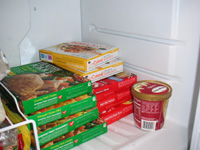
The end of the year, 2005 [Culture]
The year, 2005, is going to end. I had more or less valuable experience this year. I’ll improve myself more in next year based on this year’s experiences. As Japanese custom, we eat Soba (Japanese noodle made from buckwheat) at the end of year. Because noodle is long, we eat them hoping our long life. Then, I went to “Jimbo” with Larry to have some noodle.
In the supermarkets, there are many fireworks stuff on the shelves.
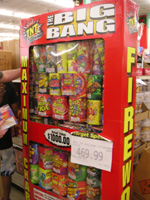
I think that doing fireworks in New Year day could be originally Chinese customs. But it seemed to be well-accepted by local Hawaiian people. Then, around my apartment, people have been enjoying fireworks since three hours before. It too noisy and is scaring me. I’m writing this blog in my room surrounding the smoke and smell of gunpowder.
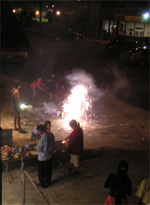
Since now I’m going to go Waikiki to enjoy celebrating New Year. Hope that next year would be great for me, my friends and family.
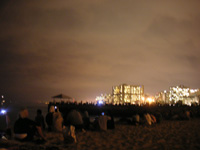
Waikiki beach just before 0:00 January 1st 2006
Mele Kalikimaka & Haoli Makahikihou! [Culture]
These Hawaiian phrases mean “Merry Christmas & Happy New Year”
When my friend, who can speak English very well, came to Hawaii, she sometime felt difficulty to understand what local Hawaiian people are talking. Actually, local Hawaiian people use Pidgin language-affected English, because Hawaiian culture consists of many races such as Polynesian, Asian, Caucasian and local Hawaiian. Besides, people naturally use Hawaiian, Japanese and Korean words.
Though “Aloha” is most popular Hawaiian word, there are many common Hawaiian words; Mahaho (Thank you), Keiki(Children), Hale(Building), Ohana(Family), Limu(Seaweeds), Poi(Mashed Taro), PuPu(Appetizer), Ahi(Tuna), Pau!(Finished), Moana(Ocean), Mauna(Mountain) etc.
There are only twelve letters less than half number we juggle in English. Five of these are the old familiar vowels: a, e, i, o, u. Seven are consonants: h, k, l, m, n, p, w. Then, Hawaiian names of place and people looks similar. In many times, I can not pronounce and remember them.
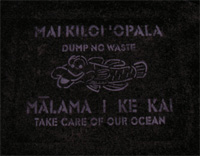
(message on the cap of manhole in UH campus)
Too Big [Culture]
Though “ACE” (http://www.acehardware.com/home/index.jsp) and “City Mill”(http://www.citymill.com/)are useful shop to buy tools and hardware, I went to “Home Depot” (http://www.homedepot.com/) located on Dillingham Blvd, to look for special lithium battery. I was also interested in “Best Buy” (http://www.bestbuy.com/), which is located near by and has just opened this summer.
I was surprised at the scale of the store. It was storage rather than store. How can we get the products on the upper shelf? I respect the spirits of DIY.
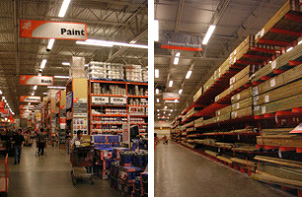
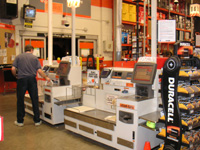
Self-service cash desk
Christmas tree sale [Culture]
Is it really December? I don’t feel December’s already started. I feel like I stay in summer vacation, ‘cause I wear still short-sleeved shirts and short. At the Starmarket near by, Christmas tree sale has started on 1st Dec. The parking is filled with good smell of tree. There are various sizes of trees. After passing check desk, guys help to adjust the tree into the favorable shape with saw. And the tree is wrapped with net by special machine. A series of works looks like the operation at fish market in Japan. Great! In Japan, December is explained with combined two Chinese characters, each of which has meaning of “master” and “run”. It’s because people are so busy to prepare the end of year and start of New Year, and then not only labors, even master also need to work hard. But, such a word would be never created here, in Hawaii. We don’t need to hurry up here.
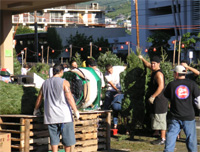
Thanksgiving day [Culture]
Today is “Thanksgiving day” What’s that? Custom of “Christmas”, “Valentine’s day” and “Halloween” have become already popular in Japan, partly due to schemes by the companies dealing with jewels, toys, chocolates, candy and vegetables. But “Thanksgiving-day” is not popular in Japan. Hey, do your best, “Turkey Company”!
Today, I was fortunately invited to Celia’s house. Thank you Celia, I did not want to eat TV dinner by myself on Thanksgiving day. It was first time that I had dinner on table with family, since I came here. I really enjoyed special dishes for Thanks giving day. Today, I took one of Japanese Sushi, Maki-sushi (Roll-sushi). When we make sushi here, we need to consider well what contents should be wrapped by rice and Nori. Eggs of fish are not usually accepted, and someone does not like sweet one. Then this time, I mainly used cheese winner, because I thought that boys likes such a food. Also to focus the decoration for the special day, I used Japanese colorful pickles. Though I worried about the taste, everyone seemed to enjoy it. Well, I wonder what I try to cook next time.
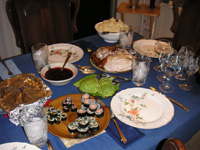
Halloween [Culture]
As I live in USA, I may have obligation to take this topic here in this season. But it seems that all of people do not necessarily enjoy this festival, except for the people who have children. I imagined that all of houses and their gardens are decorated with pumpkin’s lamps and candles, and streets are filled with dressed up people. Such images, which I probably watched in some movies or dramas, have been in my mind. Last year, my American friend, who lived in Tokyo, was excited to have short trip to Boston with Japanese traditional devil costume to join Halloween Party there. But, I can not see anything in my residential area. Why? Residents are older ones, and their children had grown up? People are immigrant from Asia and other countries, and then they do not have such a culture? People are not so rich, and then not allowed to buy such stuffs for decorations? Anyway, I’m little bit sorry that I can not see Halloween festivals here. Probably at other areas, where many children live, they would enjoy Halloween Party. On the way to UH, there is a special shop selling a lot of stuffs related to Halloween.
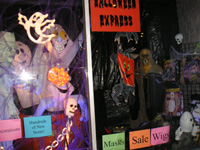
Caffeinated water [Culture]
Non-caffeine drinks, such as Decaf, are popular from the viewpoint of health and religion in USA and Europe. It is just different situation from Japan, where heavily caffeinated drinks are popular for students and businessman to prevent from getting sleepy. When I was a member of committee to manage a 10th ICRS (International Coral Reef Symposium) held in Okinawa last year, I felt kind of cultural difference for other member’s opinion that we should prepare Decaf. But I was amazed that such a healthy food was actually so popular. I think that scientists’ preference for food and evaluation for President are little bit different from average opinions. A couple of days before, Erin asked me why I was drinking caffeinated water. I had not found it was accidentally caffeinated one, though I did not mind whether it include caffeine or not.
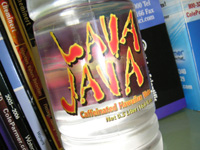
The Discover Moiliili Festival [Culture]
I feel as if I enjoyed festival every week. Is autumn the season of festival? I went to “ The Discover Moiliili Festival” held in Old Baseball Stadium Park, which is located close to my apartment.
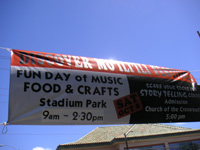
Purposes of this festival seem to be to reconfirm the roots of this area, Moiliili, and communicate more. As I introduced before at this blog, this area was pioneered by immigrants from Japan 100 years ago. I’m not sure whey a lot of people moved to these small islands in the center of Pacific Ocean. Presumably, they might have suffered from huge taxes and pressures by the lord, tyrant. There were many booths serving food and handicraft. Most attractive booth was the one, where many photographs taken 80 or 100 years ago were presented. The view around University Ave. was just different from current one.
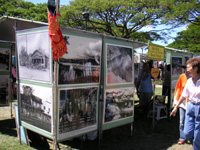
We could see how such immigrants spent hard time here, and have developed this area. Waikiki area is representative image of Hawaii for Japanese ordinary people. But I want them to know there are a lot of little-known histories and aspects in this island. In this area, there are many older Japanese-American. Their face looks like Japanese. But they wear colorful clothes and fluently speak English. They are just American.
Kava Festival [Culture]
I wrote here that I first time tasted “Kava” last month (http://blog.so-net.ne.jp/hawaiian_life_e/kava). Last weekend, an educational event, “Kava Festival”, was held in UH campus on large scale. Because electricity was accidentally (intentionally?) out in our office building,there was nothing but enjoy this event!
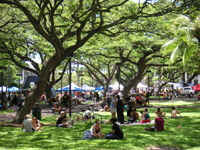
Professional Hawaiian music musicians played on the stage (Actually just entrance of building). And there were many booths, where we could taste Kava(Awa) and Hawaiian local food, and enjoy Hawaiian local handicrafts. If this event had been informed more on newspaper or something like that, a lot of people could have enjoyd it.
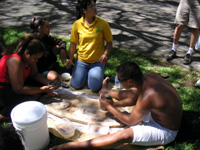
This time, I refrained from drinking Kava. Why? Hum. I wanted to keep them to other people who’ve never tried it? It sounds good answer.
In the lecture room, cultivation and chemical perspective of Kava were also presented. Now in Japan, “Noni (http://www.canoeplants.com/noni.html)” is kind of popular, but does Kava also follow it?
(Click following blue Japanese phrase, for additional photos)



